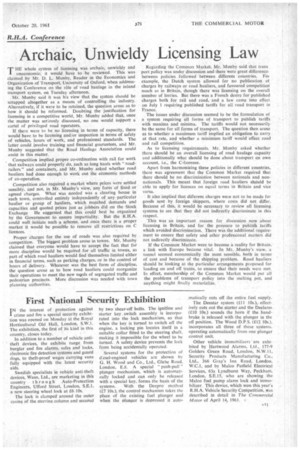Archaic, Unwieldy Licensing Law
Page 65

If you've noticed an error in this article please click here to report it so we can fix it.
THE whole system of licensing was archaic, unwieldy and uneconomic; it would have to be reviewed. This was claimed by Mr. D. L. Munby, Reader in the Economics and Organization of Transport. University of Oxford, when addressing the Conference on the role of road haulage in the inland transport system, on Tuesday afternoon.
Mr. Munby said it was his view that the system should be scrapped altogether as a means of controlling the industry. Alternatively, if it were to be retained, the question arose as to how it should be reformed. Doubting the justification for licensing in a competitive world, Mr. Munby added that, once the matter was ser:ously discussed, no one would support a cartel of privileged road operators.
If there were to he no licensing in terms of capacity, there would have to be licensing and/or inspection in terms of safety of vehicles, hours of work, and professional standards. The latter could involve training and financial guarantees, and Mr. Munby suggested that the Road Haulage Association could assist in this matter.
Competitioa implied proper co-ordination with rail for work that railways could properly do, such as long hauls with " roadrailers " and containers, and Mr. Munby asked whether road hauliers had done enough to work out the economic methods of co-operation.
Competition also required a market where prices were settled sensibly. and not, in Mr. Munby's view, any form of fixed or agreed charges. What was needed was a clearing house in each town, controlled entirely independently of any particular haulier or group of hauliers, which matched demands and capacities and quoted prices just as jobbers did on the Stock Exchange He suggested that this could best be organized by the Government to ensure impartiality. But the R.H.A. could well initiate such a scheme, and once there is a proper market it would be possible to remove all restrictions on C licences.
Proper charges for the use of roads was also required by competition. The biggest problem arose in towns. Mr. Munby claimed that everyone would have to accept the fact that far more discipline would be required for all traffic in towns, as part of which road hauliers would find themselves limited either in financial terms, such as parking charges, or in the control of hours of delivery. Whatever was the best form of discipline, the question arose as to how road hauliers could reorganize their operations to meet the new needs of segregated traffic and pedestrian precincts. More discussion was needed with town planning authorities.
Regarding the Common Market, Mr. Munby said that trans port policy was under discussion and there were great difference: between policies followed between different countries. Fen example, the Dutch system allowed for no publication of charges by railways or road hauliers, and favoured competition much as in Britain, though there was licensing on the overall number of lorries. But there was a French desire for published charges both for rail and road, and a law came into effect on July 1 requiring published tariffs for all road transport in France.
The issues under discussion seemed to be the formulation of a system requiring all forms of transport to publish tariffs with maxima and minima. The tariffs would not necessarily be the same for all forms of transport. The question then arose as to whether a maximum tariff implied an obligation to carry at that rate, and whether a minimum tariff would affect road and rail competition.
As to licensing requirements. Mr. Munby asked whether there should be an overall licensing of road haulage capacity and additionally what should be done about transport on own account, i.e., the C-licensee.
Apart from harmonizing these policies in different countries, there was agreement that the Common Market required that there should be no discrimination between nationals and nonnationals. This meant that foreign road hauliers should be able to apply for licences on equal terms in Britain and vice versa.
It also implied that different charges were not to be made for goods sent by foreign shippers, where costs did not differ. Because of this, it would be necessary to review all licensing systems to see that they did not indirectly discriminate in this respect.
This was an important reason for discussion now about licensing in Britain, and for the pressure to publish tariffs which avoided discrimination. There was the additional requirement to ensure that safety and other professional matters did not indirectly discriminate.
If the Common Market were to become a reality for Britain, a link with Europe became vital. In Mr. Munby's view, a tunnel seemed economically the most sensible, both in terms of cost and because of the shipping problem. Road hauliers should be looking at the particular arrangements proposed for loading on and off trains, to ensure that their needs were met. In effect, membership of the Common Market would put all the problems of transport policy into the melting pot, and anything might finally materialize.




































































































































